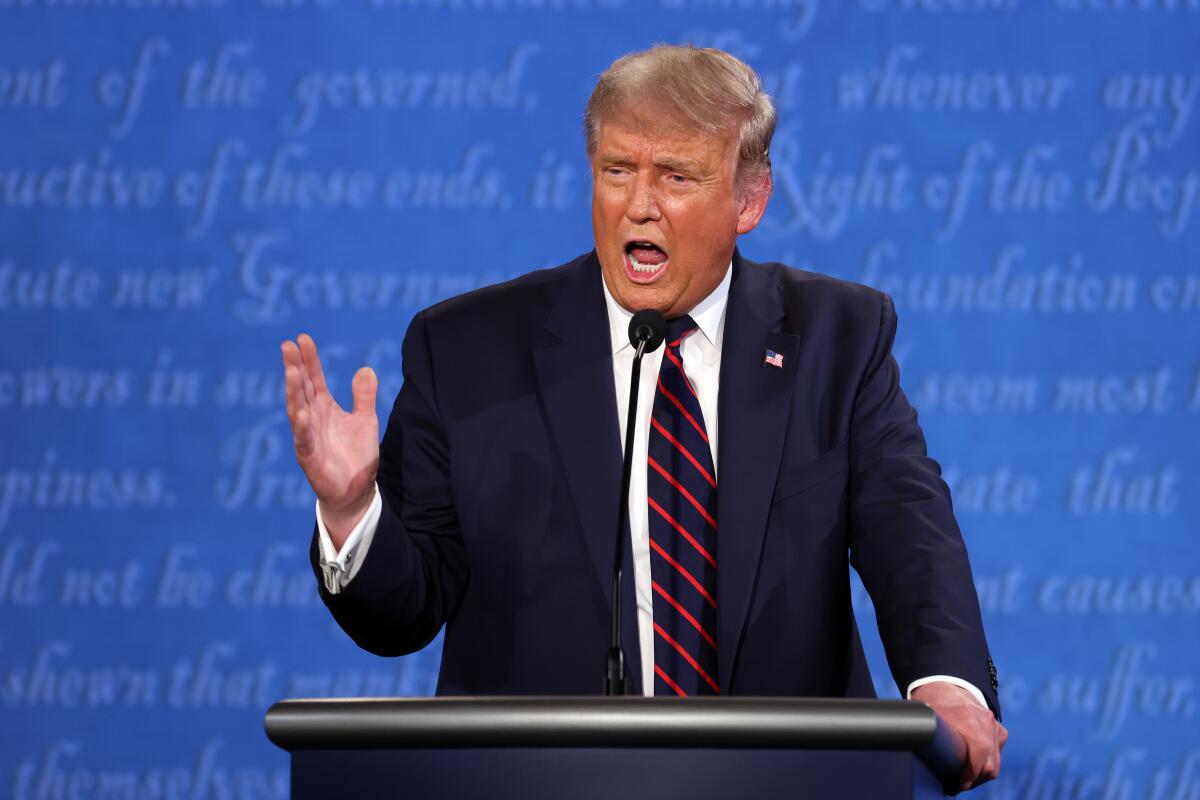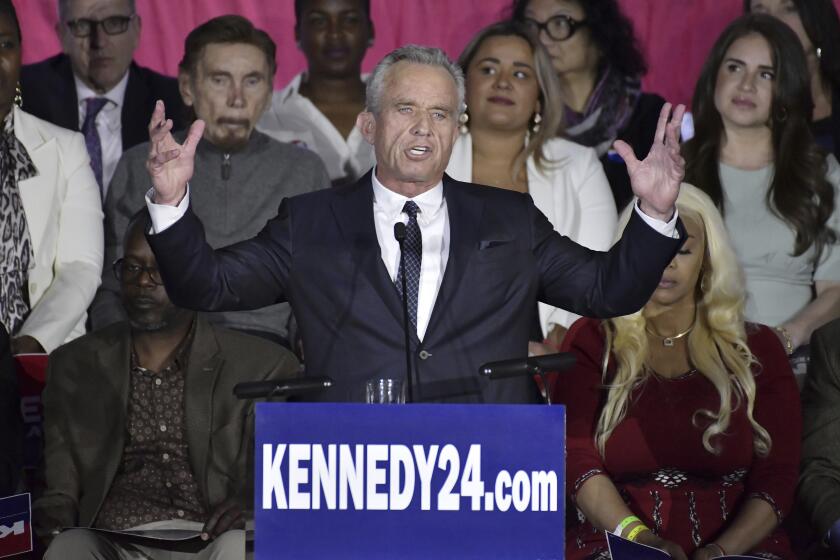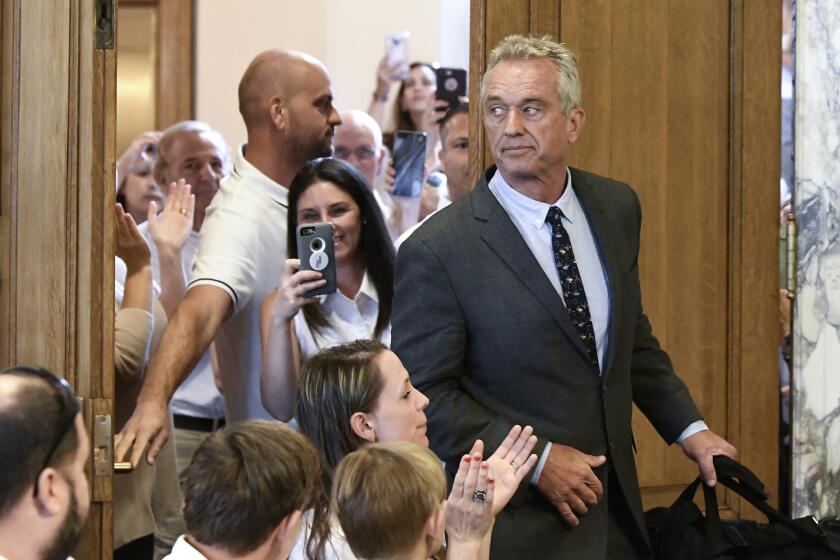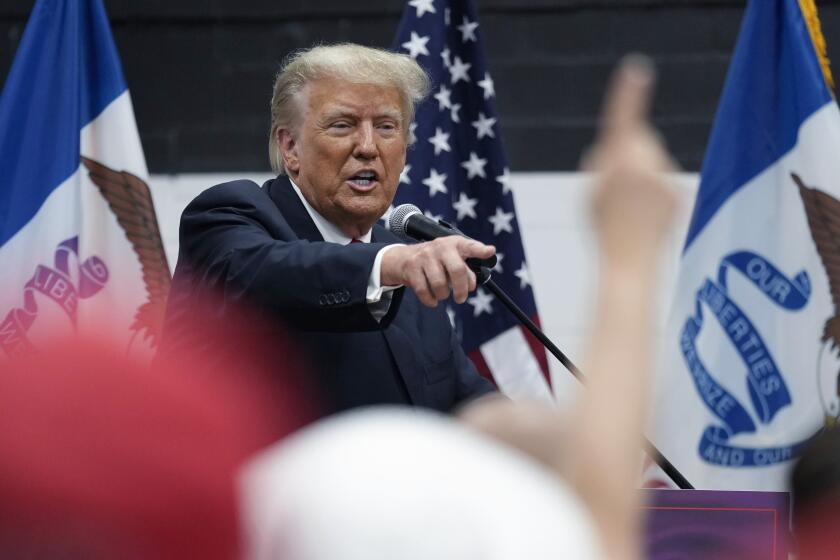Column: Why no one should ever debate Trump or RFK Jr.

- Share via
Why do we assume that a political debate is a good platform for determining who is the best candidate for the presidency, or for getting to the truth of an emotionally charged matter?
Debates are on my mind for a couple of reasons: 2024 Republican presidential hopefuls will have an opportunity together on a national stage on Aug. 23, when their first debate is scheduled to take place in Milwaukee. Also, who has not been bombarded with stories about mega-underdog Democratic candidate Robert F. Kennedy Jr.’s desire to debate his anti-vax conspiracy theories with a well-known immunologist?
When it comes to political candidates, debates can be opportunities to show their personalities, their grasp of the issues, and whether they can think on their feet. They can also reveal deadly flaws, occasionally serving as graveyards for political careers. For instance, in the 2016 debates, Jeb Bush could not overcome then-candidate Donald Trump’s characterization of him as low energy.
And it almost pains me to recall former Texas Gov. Rick Perry’s famous “oops” during a 2011 Republican presidential debate, when he forgot the third of three federal departments he vowed to eliminate. (Energy.)
For voters, most of whom will never see a candidate in person, broadcast debates offer the chance to take the measure of the man or woman asking for their vote. Not that it always makes a difference. In 2016, Hillary Clinton was widely judged to have won all her debates against Donald Trump. We see how that worked out.
Debates are not a good forum for helping us separate fact from fiction. Two candidates in the 2024 cycle — former President Trump, a Republican, and Robert F. Kennedy Jr., a putative Democrat — are essentially impossible to debate. Not because either man is such a skilled orator or in exceptional command of the facts — quite the opposite, in fact — but because both are masters of the rhetorical technique dubbed the “Gish gallop.”
Kennedy’s popularity on Los Angeles’ Westside, a hot spot of ‘conspirituality’ — where wellness and spirituality meet conspiracy theories — shows a growing left-wing distrust in democracy.
The Gish gallop is the debate equivalent of Phil Spector’s wall of sound, but instead of being produced with musical instruments, it’s accomplished with lies, half truths and obfuscation.
“Gish gallop” was coined by Eugenie Scott, a biologist and former anthropology professor who founded the National Center for Science Education in 1981 to ensure that evolution, not creationism, is taught in schools.
(If you think that issue was laid to rest, think again. Our ultraconservative Supreme Court has steadily been chipping away at the separation of church and state. Scott believes that the promoters of creationism and “intelligent design,” quiet for so long, are now merely biding their time for the right case to bring before the court.)
Scott, who lives in Berkeley, has probably spent more of her career than she would have liked debunking creationists, including the late Duane Gish, who founded the Institute for Creation Research to debunk the science of evolution. Gish galloping, said Scott, who coined the phrase in 1994, is when “you spew out a ton of information, accurate or not, that your opponent has no possibility of refuting in the time available.... It’s an effective if ultimately shallow and misleading debate trick.”
Like other tedious conspiracy-mongers, Robert F. Kennedy Jr. is adding antisemitism to his noxious brew of anti-vaccine lies.
The technique is also favored by anti-vaxxers like RFK Jr. and incorrigible liars like former President Trump. (Who, to be honest, probably aren’t even doing it consciously.)
You can be sure this phenomenon will be on display if Trump deigns to appear onstage at the first Republican presidential debate. It’s hard to imagine a narcissist like him forgoing the spotlight, but his presence is hardly guaranteed. He is, after all, running about 30 percentage points ahead of his closest rival, the desperately unlikable Florida Gov. Ron DeSantis, and also, the candidates are required to pledge that they will support the party’s eventual nominee. Unity is not Trump’s strong suit.
In any case, the notion that serious political arguments can be solved, or conspiracy theories aimed at undermining scientific reality debunked, in the course of 60- or 90-minute encounters between opponents is ludicrous.
“Debate is a sport,” Scott said. “It is not a way of informing the audience or the public of the accuracy of an opinion. It is played by rules that are different from those of logic and empirical evidence.” Debates, she once wrote, are “drive-by shootings when it comes to critical thinking.”
The first Republican presidential debate of the 2024 election cycle will be held Aug. 23, and candidates participating must pledge to support the eventual GOP nominee.
Last month, a flurry of attention was paid to renowned pediatrician and immunologist Peter Hotez’s refusal to debate vaccine safety with Kennedy.
Podcaster Joe Rogan — he of the “Hey, I am just raising questions” school of vaccine sophistry — came up with the idea for a debate between the pair last month after a long interview with Kennedy. Rogan offered $100,000, to be donated to the charity of Hotez’s choice, for the spectacle. Elon Musk, the eternal middle-schooler who recently challenged Mark Zuckerberg to a penis-measuring contest, tweeted that Hotez was “afraid of a public debate, because he knows he’s wrong.”
As my colleague Michael Hiltzik wrote, Hotez was smart to turn Kennedy down.
Debating a conspiracist is a one-way ticket to rhetoric hell, as evidenced by the rueful essays written by some who have taken the bait to counter Kennedy directly and ended up bruised by his high-velocity barrage of nonsense.
“You can come armed with all the facts in the world, but when you’re dealing with a conspiracist, there’s no real way to ‘win’ an argument,” wrote New York Times columnist Farhad Manjoo about a pointless debate he had in 2006 with Kennedy who claimed, baselessly, that the 2004 presidential election was stolen from John F. Kerry.
The Republican Party is now dominated by a conspiracy-believing crowd. That’s a far deeper problem than can be solved in one election cycle.
“For people whose views aren’t anchored to facts,” Manjoo said, “winning is simply getting attention. And when you publicly argue with someone like Kennedy, you’ve already lost.”
Exactly.
I mean, really, how would one debate someone like Kennedy, who just last week asserted that the COVID-19 virus may have been “targeted” to spare Ashkenazi Jews and Chinese people?
Sadly, a simple but true statement, “You are ridiculous and out of your mind,” is hardly going to change the hearts and minds of Kennedy’s fellow conspiracy-minded anti-vax fans.
Maybe it’s time to fight fire with fire.
On Monday, Scott told me about a debate she’d witnessed years ago, where Brown University cell biologist Kenneth Miller, a deft debater who was savvy about the Gish gallop, turned the tables on Gish and “threw out all these reasons why creationism was not scientifically supported, boom, boom, boom.”
In an email this week, Miller recalled the scene: “Gish then complained loudly to the (creationist!) moderator that this was unfair and demanded more time to respond. The moderator, however, stood his ground and refused. Gish at that point, stood up angrily and nearly knocked over the table in front of him.”
More to Read
A cure for the common opinion
Get thought-provoking perspectives with our weekly newsletter.
You may occasionally receive promotional content from the Los Angeles Times.
















